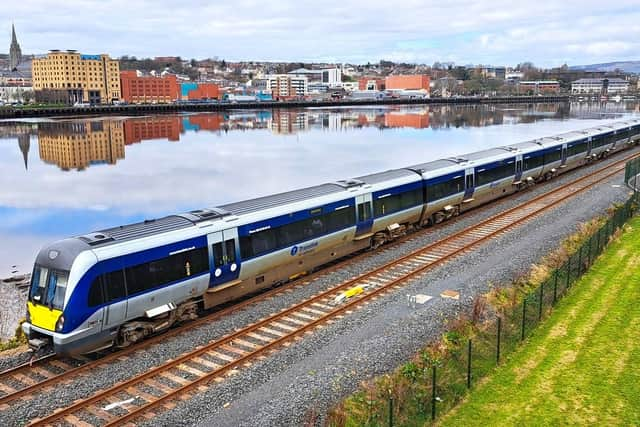Pre-Christmas bus-and-rail strikes dubbed 'heavy-handed' by union rep as train drivers expected to join rolling wave of industrial action - but not until January
and live on Freeview channel 276
A union rep has told the News Letter that there is a common misconception that train drivers are already on strike, but in fact many members feel the action during advent by other bus-and-rail workers is rather "heavy-handed".
Adrian Kelly of Unite the Union’s rail drivers section that he had disagreed with the decision by other Unite members to walk off the job in the weeks ahead of Christmas, but that he still felt solidarity with those who did.
Advertisement
Hide AdAdvertisement
Hide AdThe latest in a series of total shutdowns of the transport network will be this Friday (with normal service resuming on Saturday).


Business groups have complained that other recent days of action have cost pubs and restaurants dearly.
There are an estimated 150 train drivers in Northern Ireland, and whilst they are not on strike at present, trains still cannot run if conductors and signallers are on strike (as will happen this Friday).
Mr Kelly is head of the Unite Operations Branch (representing rail drivers and some signallers) which is balloting for strike action right now.
Advertisement
Hide AdAdvertisement
Hide AdThe results are due on January 8, and he expects it will be a "yes".
If so, the earliest strike date will be January 18, when all public sector unions will be out.
What about the pre-Christmas strike action on the buses and trains?
"Taking strike action in the run-up to Christmas would obviously have highlighted the issue," he said.
Advertisement
Hide AdAdvertisement
Hide Ad"But we didn't think it was the right thing to do. We took the same stance we took in the public sector pensions strikes a number of years back.
"We thought the pain to the public, the pain to business, and the pain to our members, to make a political point would've been a bit heavy-handed.
"I think we can make the same point to local politicians, to the Secretary of State, via a better, co-ordinated public sector-wide industrial action [on January 18]."
All the same, he said he sympathises with striking union members, adding that "we're all in the same boat".
Advertisement
Hide AdAdvertisement
Hide AdMr Kelly also said that, once pay and pension contributions are taken into account, train drivers would lose about £200 per day of strike action.
The typical wage for a train driver in Northern Ireland is about £45,000, Mr Kelly said - but this is way below counterparts in Great Britain and the Republic of Ireland.
In England he said train drivers have been awarded a 13.8% pay hike, taking a typical wage to about £65,000.
What is more, he added, the contracted hours are different, and in England drivers work 90 minutes less per week.
Advertisement
Hide AdAdvertisement
Hide Ad"I drive a train from Belfast to Dublin," he said. "I hand that train to an Irish Rail driver who takes over the exact same train, and drives it to Belfast on the exact same line, but earns about 14,000 Euros per year more than me. It's not even close."
In Northern Ireland the drivers are holding out for an 13.8% rise, like in England.
As to what he'd say to people who think, at £45,000 per year, train drivers are well enough off already, Mr Kelly said the salary is largely down to the "responsibility" which such workers bear.
"You can't compare a bus driver's salary to a pilot's salary. They both in essence transport people. But one is a way more hazardous and responsible job."
Comment Guidelines
National World encourages reader discussion on our stories. User feedback, insights and back-and-forth exchanges add a rich layer of context to reporting. Please review our Community Guidelines before commenting.